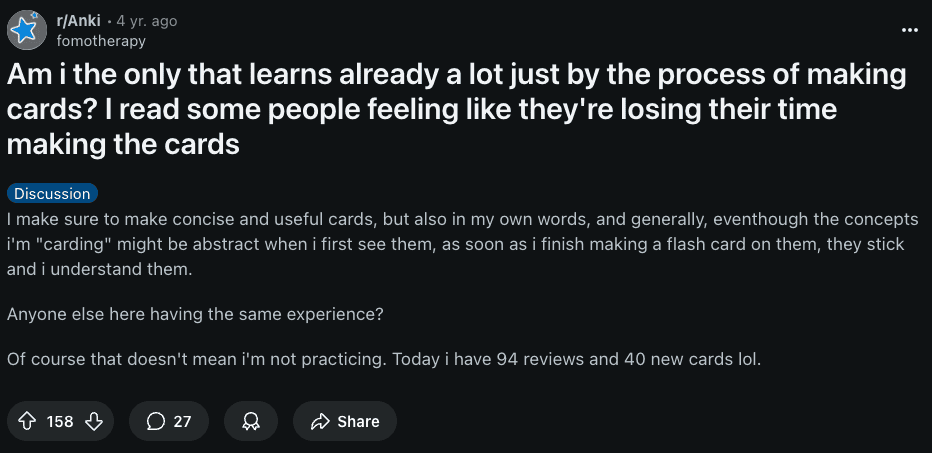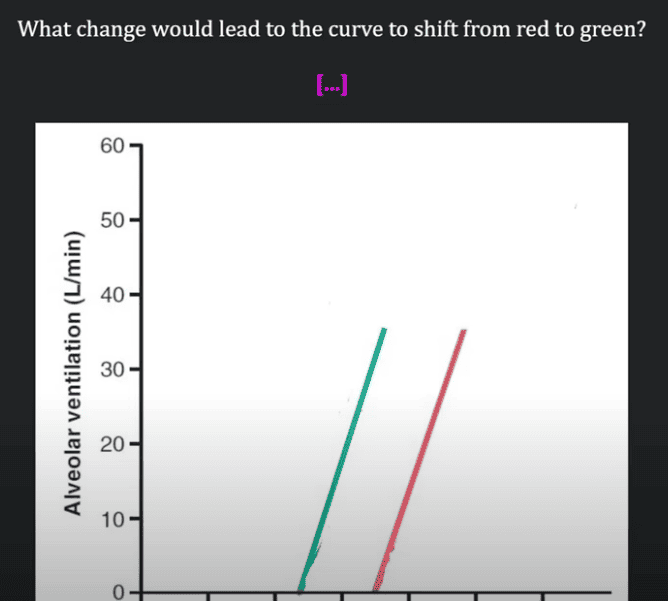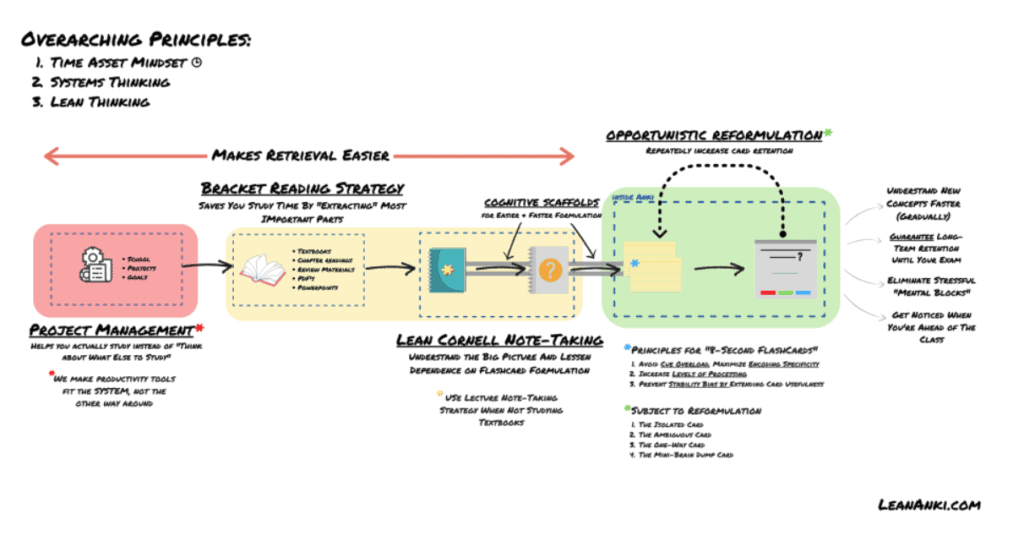For years, I’ve struggled to really define how to lead people from just being familiar with Anki to getting REALLY good at learning itself.
I mean, first thing is that you don’t have many people using it in the first place.
They think it’s only for “learning random vocabulary” but in reality, if you use it right, it could the best learning tool for dealing with massive amounts of information across multiple disciplines.
Second: Anki is not popular because people prefer much easier methods even though the results are based on nothing but LUCK.
If we think the same, I’m sure you don’t want that.
You want “strong retention” to be something of a choice that you make, rather than something that hopefully came out of “spending more hours studying”.
Because the truth is that as you ascend “levels of Anki mastery” (as I call it), the LESS your hours would correlate to your results.
Which means you get MORE learning, MORE retention, in LESS time.
So I created “levels” that I personally went through, that I also see other effective Anki users go through as well. They are:
- The Anki beginner
- The Anki practitioner
- The Anki strategist
- The Anki Virtuoso
We’ll talk about each in GREAT detail.
Level 1: Anki Beginner

(Image credits to u/sickestambition)
You discovered Anki because someone said it would solve your memory problems.
“Just download this deck,” they said. “Review daily and you’ll remember everything.”
So you did what made sense — find shared decks for your desired topics, downloaded thousands of cards.
When you create your own, you make cards for EVERYTHING because that’s what organized students do, right? “Capturing important information.”
BUT IT TAKES SO MUCH TIME. So you find a way to make things faster, which cause your cards to more or less look like this:


You probably know how this plays out — FLASHCARD HELL:
- You add new cards from every material you want to remember
- Reviews get a little bit heavier, but you bear it still
- Making the cards starts to feel like work — an hour to read the slides, an hour to make cards, then an hour to review
- You realize that you shouldn’t be spending more time on Anki rather than…you know…actually progressing on your studies
- You’re not enjoying it anymore. Doing Anki feels like you’re getting stabbed by a stick for 2 hours straight
This is exactly why people quit:
It’s NOT their fault that these cards were just ineffective. But they do make Anki unsustainable and unfun.
I fell into the same trap before, and I’m here to tell you that you were just given the wrong map. (Which is why this guide exists in the first place!)
Level 2: Anki Practitioner

The Anki Practitioner knows that the PROCESS of creating cards IS active learning, and 95% of your results come from only 5% of the features.
Something finally clicked!
Maybe you read a blog post, watched the right video, or stumbled upon the truth that the “study/productivity gurus” never mentioned — that you need mental connections BEFORE making cards.
You find out that your memory was never broken! You just weren’t feeding it properly.
As an Anki Practitioner, you can make the most out of Anki itself, because you understand:
- What actually deserves a card (not everything!)
- How to phrase questions that stick
- That understanding comes first, memorization second
- The 20 rules of formulation actually make sense
No wonder shared decks never worked!
- Most shared decks are poor quality
- They never aligned with YOUR learning
- They never even aligned with your material
Side note: The exception to this is of course, the shared decks that EFFECTIVE ANKI LEARNERS themselves also created. Which is rare. Only recommendable thing I’ve heard of is AnKing’s decks for Med, which is perfectly aligned with the standard materials AND are of really high quality.
At this point, you start looking forward to your reviews. You actually enjoy them. Every repetition feels like you’re getting stronger and stronger retention.
Total review time drops from 5 hours to under an hour per day.
You learn WAY more making your own flashcards because it’s WAY more active compared to your old passive studying methods.
You feel empowered. Reviews feel like small wins, not dreaded “looping” sessions. And every card you create is proof that you GET IT.
How to Become an Anki Practitioner
In order to get to this level, you need to focus on flashcard making skills.
You need to be able to test higher-level mental processes, like this: (Credits to Akshit Tuli, INICET Rank 5)

Use simple settings, essential add-ons, and a deck setup specific to your own goals, because frankly that’s what you need.
I recommend these resources to improve your flashcard making skills:
- 20 Rules of Formulating Knowledge [LINK]
- How to Make Better Anki Flashcards [LINK]
- How to write good prompts: using spaced repetition to create understanding by Andy Matuschak [LINK]
- Augmenting Long-Term Memory by Michael Nielsen, Quantum Computing Pioneer [LINK]
- Prerak Juthani – Using Anki to Memorize 10,000+ Flashcards [LINK]
- Med School Insiders – 13 Steps to Better Anki Flashcards [PART 1] [PART 2]
Of course, I have a much faster method 😉 But if you’re looking to do it yourself, these are the best I’ve found.
Level 3: Anki Strategist

Example Anki Workflow for Board Exam
The Anki Strategist can create integrated Anki workflows for different goals—using the right active learning tactics for the right materials.
You’ve transcended the “Anki tips and tricks” content.
While others debate “perfect settings” and “target retention rates”, you’re building learning SYSTEMS.
Why? Because you know that true efficiency was NEVER about optimizing Anki.
It was about eliminating waste in your ENTIRE learning process—which Anki is only a part of.
You now know that those forums arguing about algorithms are optimizing the wrong variable.
So, back to the systems. Here’s an example, for a textbook:
- Pre-read to build mental scaffolding (priming effect)
- Process deeply using active techniques (elaborative encoding)
- Create questions that exploit higher-levels of learning (Bloom’s taxonomy)
- Interleave topics naturally (interleaving effect – automatic with Anki)
- Space reviews optimally (spacing effect – also automatic)
At this point— I’m not kidding — you can process ANY material ONCE and trust it’s locked in. Textbook chapters, video lectures, question banks, etc..
All because you have a system that’s producing REPEATABLE RETENTION.
Your system is SO efficient, you’re handling multiple subjects, you’re ahead of your workload, and you actually enjoy life outside of studying.
This was my secret sauce for my board exams. I can touch a chapter once—maybe just 30 minutes longer—and remember every detail months later.
How to Become an Anki Strategist
This one’s short. But then I almost never see anyone talking about these.
Practically speaking, you want to focus on improving your base active learning skills:
- The encoding paradigm of note-taking
- Analytical Reading (see: Mortimer Adler’s How to Read a Book)
- Improve the way you make questions (see: Bloom’s Taxonomy)
Once you’re done with your Fundamental Skills, you want to create an efficient Anki workflow. [WARNING: This is another LOOOOONG read]
And best of all, use TEXTBOOKS as primary sources for your learning. That’s the BEST thing that will ever happen to your learning career 🙂
If you want to dig deeper, you may want to read further materials to understand how learning and memory really works, at the fundamental level:
- Noba Project’s overview on memory
- Learning How to Learn by Barbara Oakley (she also has a free Coursera course on this)
- A Mind for Numbers by Barbara Oakley (if you’re also trying to learn for problem-solving subjects)
- Unlimited Memory by Kevin Horsley (Memory champion)
Then these papers:
- A simple view of reading. made me realize just how important remembering is. Without remembering, reading comprehension TANKS.
- A new theory of use and disuse in memory. This is the thing that made the most sense why Anki doesn’t work for others and worked for many. The difference is simply storage vs retrieval strength. Better storage = slower forgetting. There’s a lot to this theory, and I recommend if you’re going to go really deep, this is the GOAT.
- Six views of embodied cognition. This is where I realized how to teach others how to develop flashcard formulation skills. We can use our environment to make overwhelming cognitive load so much “lighter”, for example, writing down a non-atomic questions FIRST can help you write better atomic questions, if you’re just starting out.
I don’t read empirical research as much nowadays (though I’ve read a lot of them) because it’s so much more practical to look at meta analyses and systematic reviews, and also study the practitioners who are actually good at doing certain things. For example:
- Memorizing isolated facts = memory athletes who can memorize thousands of digits of pi
- Memorizing both facts and concepts = none other than medical students who successfully used Anki (it’s how I got started back in 2017, and consuming Prerak Juthani and AnKing’s content helped me rank top 1% on my boards)
- Problem solving subjects = I studied mental processes of the top engineering students in the country – which happen to be our mentors back in our exam prep.
So you NEED a mishmash of practice and theory. I only teach people the condensed practical stuff, though, because we’re already drowning in so much information 🙂
Level 4: Anki Virtuoso

The Anki Virtuoso uses Anki as a personal memory system—and also for knowledge work.
Learning became your lifestyle. Remembering has become a choice.
You realize what held everyone back — they thought Anki was all about memorizing random words.
But you knew it could be used for SO MUCH MORE. You discovered it’s about augmenting human cognition itself.
Now you’re not just remembering more. You’re thinking better! 🙂
Your Anki has become a thinking tool for becoming a “polymath”, and as a side effect, for generating original work.
At this point, you’re not just a consumer anymore — you’re more of a creator:
- Synthesizing across disciplines to create novel insights
- Contributing to your field through original thinking
- Building on the frontiers of what’s known
- Teaching others through your unique perspective
The way you learn now looks closer to Mortimer Adler’s “syntopical reading” — building understanding across entire literatures, seeing patterns invisible to specialists stuck in silos.
Even so, you make sense of new material much quicker simply because you have more “mental ingredients” to work with.
You’ve internalized so many “chunks” that complex ideas seem simple.
You work with mental models consciously — not just remembering facts but understanding the underlying structures of knowledge itself.
How to Become an Anki Virtuoso
You just start using Anki to follow your curiosity, build expertise, and create things. That means a few things:
- You can use Anki proficiently enough for that
- You have enough things you’re curious about
- You care enough to be REALLY good at one thing
- You do either private/published writing, at the bare minimum. (i.e. You use notes as a tool for thinking)
I don’t consider myself an Anki Virtuoso, (especially now that it’s more appropriate for me to use Zettelkasten Method) but I consider the identity to be an ideal to strive for. As of this writing, my ideal scenario is:
- I can create strategic fluency for skills that require information to execute
- ex: Basketball plays and patterns
- The right responses for certain social situations
- Fingerstyle guitar patterns that I see from Sungha Jung’s arrangements (or Kent Nishimura)
- I can be more “in flow” with my writing, as I create surprising connections from different sources to create interesting, original work
- I can generate unique frameworks and models (this is for practical applications) because the fluency helps me map out relationships
You can read more about this here.
You want to keep moving forward

This isn’t about “working harder” — but working harder on the right things. Understand what each level actually demands from you, so you can deliberately practicing those specific skills.
At this point, the only thing stopping you is NOT “more information”, but rather better implementation.
Next Step: Go to “Start Here” page to learn how to make the most out of Anki
